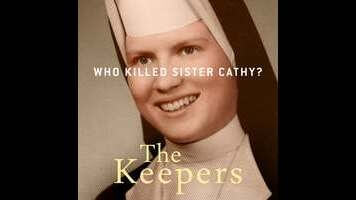A half-century of secrets comes to light in true-crime miniseries The Keepers

The Keepers, Netflix’s newest documentary miniseries, ostensibly revolves around the 1969 murder of Sister Cathy Cesnik, a beloved teacher at a Baltimore Catholic high school whose case remains unsolved nearly 50 years later. But she’s only a small part of a bigger puzzle—which is how Sister Cathy, who’s painted with a saintly brush throughout the series, would have wanted it. Like Making A Murderer—the series to which any Netflix true-crime series will inevitably be compared—The Keepers is concerned with mechanisms of power and how they are maintained. But rather than delving into the twists and turns of a criminal case, it asks why certain crimes aren’t investigated.
The series is also a testament to the tenacity and determination of women, particularly older women, who keep pounding on the doors of the criminal justice system even when those doors are repeatedly slammed in their faces. First, we meet Gemma Hoskins and Abbie Schaub, two former students of Sister Cathy’s, now in their early 60s, who have devoted their retirement years to solving her case. Then there’s Jean Hargadon Wehner, a classmate of Hoskins and Schaub’s who is introduced as a potential witness in Cesnik’s case, but turns out to have a much bigger story to tell. Given the vague outlines of cover-ups and the Catholic Church, it’s not hard to make the leap that the systemic sexual abuse of children is involved in that story, which is outlined in detail over two especially gutting episodes and serves as a parallel storyline to Hoskins and Schaub’s dogged investigation efforts throughout.
The allegations of abuse revolve around one man, Father Joseph Maskell, who worked with Cesnik at Archbishop Keough High School and who, the series posits, was somehow involved in her murder after she threatened to expose him. The accusations leveled against Maskell in The Keepers are absolutely sickening, as is the fact that he never faced justice in his lifetime. Director Ryan White (The Case Against 8, Good Ol’ Freda) skillfully parcels out details from episode to episode, often ending on a question that’s answered in the next chapter in a presumed nod to the binge-watching format. This way, over the course of seven episodes, he can transition between juicy true-crime theories and devastating accounts of institutional apathy with minimal shock to viewers’ systems, covering everything from the controversy over repressed memories to a particularly grotesque investigation into the life cycle of maggots.
Where White isn’t always as successful is in tying these disparate threads together. The story begins in the late ’60s, but jumps around from the ’70s to the ’90s to the present day; with such a broad scope, it’s inevitable that certain topics will remain under-explored, oversights that are especially glaring when it comes to a brief detour into the Black Lives Matter movement and the (possibly related) murder of another young woman, Joyce Malecki. The visual style of the series is also standard true-crime documentary fodder—albeit with limited re-enactments—and much of it could have just as easily worked as a podcast.
Toward the end of the series, The Keepers does make a strong case for extending the statute of limitations on child sexual abuse. But mostly these are jaw-dropping tales about horrific things that happened a long time ago, limiting the urgency of the narrative. Most of the suspects in the cases are either dead or in the grips of dementia, and so the only ones left to tell the story are the victims and their family members. In that way, The Keepers is more of a meditation on memory and truth than a murder mystery, and the telling of the tale is a resolution in itself. The “keepers” of the title aren’t just the keepers of the status quo, but the keepers of the secrets that threaten that status quo. And it’s in the telling of those secrets that the only justice left to the victims will be served.